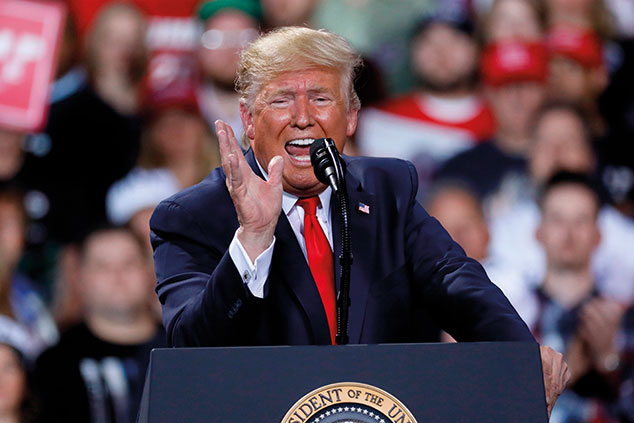
The US earnings cycle turns down
The year is ending on a “bullish note”, but closer analysis threatens to “deflate the bubble of optimism”, says John Authers on Bloomberg. US earnings-per-share growth has declined this year. All of the share-price gains have been driven by higher price/earnings ratios; stocks are more expensive compared with fundamentals than they were a year ago. That figure would be even worse if it weren’t for extensive buybacks, which prop up share prices. On 3.5 times book value the S&P is trading at a “level it hasn’t reached since before the 9/11 terrorist attacks of 2001”.
High valuations in America mean that further upside is likely to be limited, agrees Andrew Sheets in Morgan Stanley’s 2020 Global Strategy Outlook. Global growth probably bottomed out this quarter and should pick up next year. Yet “valuations are much more expensive today than in a typical mid-cycle slowdown” and an unpredictable trade outlook means that the recovery still “rests on a knife-edge”. Investors will require an “outsized level of nimbleness” if they are to enjoy a prosperous 2020.
Not everyone is so gloomy, say Matthew Rocco and Jennifer Ablan in the Financial Times. On average analysts expect a 10% bump in S&P 500 earnings per share next year. Eight major banks are forecasting an average 4.6% S&P 500 gain for 2020. Yet that relatively modest forecast still reflects a view that this year’s strong returns “may have stolen the market’s thunder for 2020”.
Two wild cards
The two big wild cards for the year ahead are the US-China trade dispute and US presidential election, Darrell Cronk of Wells Fargo Investment Institute tells the FT. Heated election rhetoric could create more market chaos. “Fortunately, a look at history shows that presidential election years have generally produced positive equity results.”
The trade war is likely to move into a new phase next year, says Neil Shearing for Capital Economics. Trump has agreed to scale back tariffs on Beijing in return for higher purchases of US agricultural products, which “has raised hopes of a lasting breakthrough”. The conflict is likely to move away from tariffs towards issues such as “technology, industrial policy and security” in 2020. US-China decoupling will thus continue, but in a way that is less disruptive than tariff wars for the global economy.
Forecasts for the year ahead should be taken with a pinch of salt, says Otani. Forecasters have been caught off guard by everything from the 2015 oil-price collapse and the 2016 US election to this year’s mammoth slide in bond yields. Expect investment banks to revise their predictions multiple times before the end of 2020.